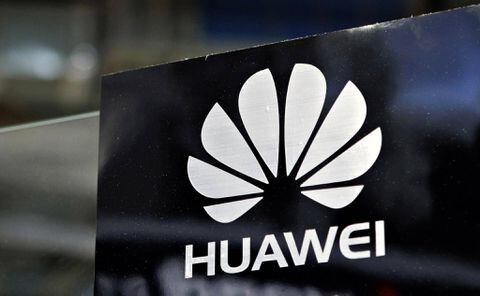Ex-Mountie Pierre Perron takes job with controversial Chinese firm Huawei
A Huawei logo is seen above the company's exhibition pavilion during the CommunicAsia information and communications technology trade show in Singapore in this June 19, 2012 file photograph. Huawei is the world’s biggest telecommunications-equipment manufacturer.
UPDATED: 2 DAYS AGO
RCMP assistant commissioner Pierre Perron, a 35-year Mountie, was the national police force's chief information officer until he retired in March. He has been hired by Huawei Technologies as a brand ambassador for the Shenzhen-based company's police information technology initiative.
Some observers suggest the move fits a pattern. Huawei, founded by a former senior officer of China's People's Liberation Army and long viewed with suspicion by North American governments, has lately been hiring government officials from the West, including some who spent many years promoting public safety.
The company "has had a very aggressive campaign to soften its image," said Chris Parsons, a researcher at the University of Toronto's Citizen Lab. He added that "having a high-level Mountie might be sufficient moral suasion to alleviate some of the concerns."
Huawei, the world's biggest telecommunications-equipment manufacturer, sells everything from smartphones to information-technology suites for government agencies. But the company built its brand selling switches, routers and other huge data hubs, which now lie at the core of many countries' communications infrastructures.
But not in North America. The United States and Canada have pressed government agencies and private carriers not to buy Huawei equipment for core infrastructure due to fears of foreign spying.
Huawei and China have long argued that concerns are misguided. In March, Beijing's new ambassador publicly called upon Ottawa officials to open up more to Huawei. "If we abuse the excuse of national security – this is the manifestation of trade protectionism," Lu Shaye told The Globe and Mail.
Mr. Perron, the former RCMP officer, will move to London to join Huawei's "Safe City" initiative. It aims to market information-technology to global police forces, including programs that would allow police communications gear to upload and share data to central computer systems, according to corporate materials.
"I didn't see anything that made me feel nervous about in joining Huawei, especially in the role I'm in," Mr. Perron said in an interview. He added he will be focusing on North Africa, the South Pacific and Western Europe. He apprised the RCMP of his intent to join Huawei, and the police force cleared the move.
Scott Bradley, a Huawei spokesman in Ottawa, stressed that the ex-Mountie will not do any work in Canada. "Mr. Perron will not be lobbying the Canadian government on behalf of Huawei or Huawei Canada," he said.
Before retiring, Mr. Perron had been among the top 50 ranking Mounties in the police force. In 2007, he was seconded for a year to Ottawa's most central bureaucracy, the Privy Council Office.
Most recently, Mr. Perron was RCMP's globetrotting chief information officer. He gave a speech in Australia in 2016 about how the Mounties' are increasingly "harnessing and utilizing massive amounts of information" gathered during everyday police work. That same year, he travelled to New Zealand for a meeting of police officials in the Five Eyes Law Enforcement Group.
The Five Eyes partnership is a series of close security relationships among Canada, the United States, Britain, Australia and New Zealand within which police, prosecutors and spies have separate forums to discuss matters of mutual interest.
Most famous are the Five Eyes intelligence analysts who conduct electronic-eavesdropping campaigns against entities they view as adversaries. Huawei came up in a U.S. memo circulated to the wider group that emerged as part of the 2013 Edward Snowden leaks: – "There is also concern that Huawei's widespread infrastructure will provide the PRC [People's Republic of China] with SIGINT [signals-intelligence] capabilities."
In 2012, the U.S. House of Representatives intelligence committee went public with allegations that buying Huawei equipment for core networks would threaten national security. "U.S. government systems, particularly sensitive systems, should not include Huawei," the members wrote in their report. A spokesman for prime minister Stephen Harper intimated that Canada had similar strictures. "I'll leave it to you if you think that Huawei should be a part of [the] Canadian government security system," Andrew MacDougall told The Globe at the time.
Huawei is constantly growing globally and diversifying its product lines. It now sells less-sensitive network gear to large carriers in Canada. And some of its hires have challenged what has become conventional wisdom in North American national-security circles.
In 2012, Huawei hired a former U.S. Department of Homeland Security official who specialized in cyber-security issues.
The company also made overtures around that time to a retired spymaster who had headed the U.S. National Security Agency and U.S. Central Intelligence Agency.
"I did receive a series of briefings from them that clearly were designed to elicit my support for a business presence in the United States. I thanked them for the briefing and moved on," Michael Hayden told The Globe in an e-mail. He added that the presentations failed to change his views on Huawei equipment.
Mr. Perron says he is not a technologist – he is just optimistic Huawei's police products will be a boon for less-advanced countries.
He insisted he will always stay mindful of the oaths he swore as a Mountie. "I am well versed on my obligations under the Security of Information Act," Mr. Perron said.

No comments:
Post a Comment
Comments always welcome!